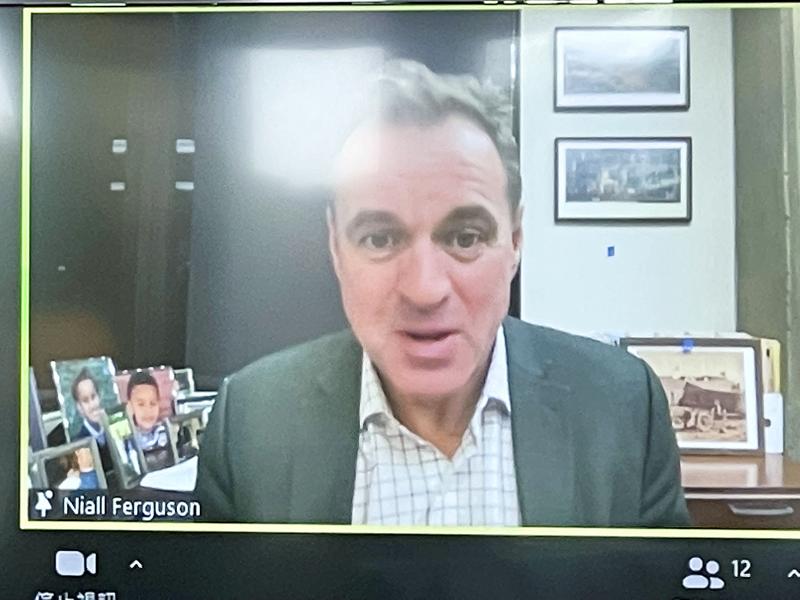China would likely ramp up pressure on Taiwan next year, British historian Niall Ferguson said on Saturday, adding that deterrence is key to warding off Beijing’s threats.
Ferguson made the remarks at a talk organized by the Taipei School of Economics and Political Science Foundation.
Attending the event virtually, Ferguson, the Milbank Family Senior Fellow at Stanford University’s Hoover Institution, said that Beijing would likely increase pressure on Taiwan after the Chinese Communist Party’s (CCP) 20th National Congress concludes in the autumn, when Chinese President Xi Jinping (習近平) is expected to secure a third term as leader.

Photo: CNA
Xi sees bringing Taiwan under Chinese control as the ultimate goal of his leadership, Ferguson said, adding that domestic problems in China, such as a slowing economy and a growing debt problem, has threatened the legitimacy of the CCP’s rule.
In the meantime, China has been facing a backlash from the international community over accusations that it covered up the initial outbreak of the COVID-19 pandemic in Wuhan in late 2019, as well as its practice of “wolf-warrior” diplomacy, he added.
The US and its allies should be committed to a credible deterrence strategy that could prevent “China from acting recklessly with respect to Taiwan,” Ferguson said. “Deterrence is key here.”
“And it’s not just the United States that can deter China. It’s the United States and [its] allies,” he said, alluding to countries such as Japan, which has expressed concerns over security and stability in the Taiwan Strait.
Ferguson said that a “cold war II” is happening between Washington and Beijing, and that if it “turns hot,” Taiwan would be a hotspot.
Washington could trigger a conflict if it pursues a policy of verbal commitment to Taiwan while continuing its confrontational strategy in its dealings with Beijing, Ferguson said.
It would be a “nightmare scenario” for Taiwan, as the nation would end up “being a battlefield in a battle that the United States is not actually properly prepared to fight,” he added.
“Ultimately in a cold war, there are two superpowers and your relationship with those superpowers is the most important decision you have to make in terms of a foreign policy,” Ferguson said, adding that he believed “Taiwan has an easy choice” to make on the issue.
While commending Taiwan’s efforts to fight off China’s information warfare campaign, Ferguson said that Taiwan “does not really have a particularly compelling self-defense strategy at this point” to counter growing military threats from China, citing his recent discussions at the Hoover Institution with Taiwanese military experts.
“It [Taiwan] is far from being a porcupine,” he said, a reference to reports by Western media last year that Taiwanese and US policymakers had been pursuing a “porcupine strategy” of increased coastal defenses and cruise missiles.

ACTION PLAN: Taiwan would expand procurement from the US and encourage more companies to invest in the US to deepen bilateral cooperation, Lai said The government would not impose reciprocal tariffs in retaliation against US levies, President William Lai (賴清德) said yesterday, as he announced five strategies to address the issue, including pledging to increase Taiwanese companies’ investments in the US. Lai has in the past few days met with administrative and national security officials, as well as representatives from various industries, to explore countermeasures after US President Donald Trump on Wednesday last week announced a 32 percent duty on Taiwanese imports. In a video released yesterday evening, Lai said that Taiwan would not retaliate against the US with higher tariffs and Taiwanese companies’ commitments to

Intelligence agents have recorded 510,000 instances of “controversial information” being spread online by the Chinese Communist Party (CCP) so far this year, the National Security Bureau (NSB) said in a report yesterday, as it warned of artificial intelligence (AI) being employed to generate destabilizing misinformation. The bureau submitted a written report to the Legislative Yuan in preparation for National Security Bureau Director-General Tsai Ming-yen’s (蔡明彥) appearance before the Foreign Affairs and National Defense Committee today. The CCP has been using cognitive warfare to divide Taiwanese society by commenting on controversial issues such as Taiwan Semiconductor Manufacturing Co’s (TSMC, 台積電) investments in the

HELPING HAND: The steering committee of the National Stabilization Fund is expected to hold a meeting to discuss how and when to utilize the fund to help buffer the sell-off The TAIEX plunged 2,065.87 points, or 9.7 percent, to close at 19,232.35 yesterday, the highest single-day percentage loss on record, as investors braced for US President Donald Trump’s tariffs after an extended holiday weekend. Amid the pessimistic atmosphere, 945 listed companies led by large-cap stocks — including Taiwan Semiconductor Manufacturing Co (TSMC, 台積電), Hon Hai Precision Industry Co (鴻海精密) and Largan Precision Co (大立光) — fell by the daily maximum of 10 percent at the close, Taiwan Stock Exchange data showed. The number of listed companies ending limit-down set a new record, the exchange said. The TAIEX plunged by daily maxiumu in just

‘COMPREHENSIVE PLAN’: Lin Chia-lung said that the government was ready to talk about a variety of issues, including investment in and purchases from the US The National Stabilization Fund (NSF) yesterday announced that it would step in to staunch stock market losses for the ninth time in the nation’s history. An NSF board meeting, originally scheduled for Monday next week, was moved to yesterday after stocks plummeted in the wake of US President Donald Trump’s announcement of 32 percent tariffs on Taiwan on Wednesday last week. Board members voted to support the stock market with the NT$500 billion (US$15.15 billion) fund, with injections of funds to begin as soon as today. The NSF in 2000 injected NT$120 billion to stabilize stocks, the most ever. The lowest amount it